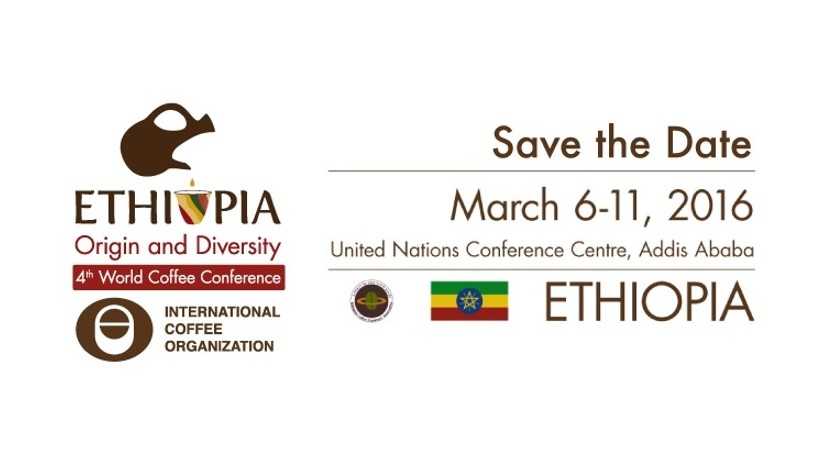ADDIS ABABA – The Government of Ethiopia will host the International Coffee Organization’s (ICO) 4th World Coffee Conference and 116th International Council meeting on March 6-11, 2016 in Addis Ababa, Ethiopia.
This conference is the first of its kind on the African continent, the centre of origin and diversity for all the coffee species known to date.
The objective of this conference is to bring together all stakeholders in the sector to review key production and marketing issues and forward solutions that would shape the future of the coffee industry in such away it benefits producers and the consumers fairly.
In view of this, high-level speakers, topical discussions, and an exhibition of products and services are included in the range of the events’ programming.
This is the full program to the event.
| SATURDAY, MARCH 5, 2016 | |
|---|---|
| 9:00-19:00 | Badge collection and exhibition set up [UN Delegates’ Registration Office, Gate 2, UNECA Conference Centre] |
| SUNDAY, MARCH 6, 2016 | |
| 9:00-19:00 | Badge collection and exhibition set up [UN Delegates’ Registration Office, Gate 2, UNECA Conference Centre] |
| 18:00-20:00 | WELCOME RECEPTION, HILTON HOTEL |
| MONDAY, MARCH 7, 2016 | |
| 8:00-9:00 | Badge collection and security clearance [UN Delegates’ Registration Office, Gate 2, UNECA Conference Centre] |
| 9:00-12:00 | OPENING CEREMONY AND WELCOME SPEECHES Chairman: H.E. Mr Wondirad Mandefro, State Minister of Agriculture and Natural Resources, Ethiopia Mr Hussein Agraw, President of the Board, Ethiopian Coffee Exporters Association (ECEA) Dr Akinwumi Ayodeji Adesina, President, African Development Bank (AfDB) |
| 12:00-12:15 | TRADITIONAL MUSIC AND DANCE |
| 12:30-13:00 | EXHIBITION OPENING CEREMONY & VISIT |
| 13:00–13:30 | PRESS BRIEFING WITH DIGNITARIES |
| 13:00–14:30 | LUNCH |
| 14:30–16:00 | PANEL 1: TOWARDS A DIVERSE AND SUSTAINABLE COFFEE CULTURE What is needed to establish a coffee sector that provides farmers with a fair remuneration and consumers with a quality coffee experience? This session will review the diverse culture of coffee in producing countries and the challenges to economic sustainability. Panellists from a variety of producing countries will share their experience of coffee culture. Moderator: Mrs Geraldine J. Fraser-Moleketi, Special Envoy on Gender, AfDB
|
| 16:00–16:15 | COFFEE BREAK |
| 16:15–17:30 | PANEL 2: WORLD COFFEE CONSUMPTION TRENDS Following years of impressive growth in coffee consumption across the world, will demand for coffee continue to increase given the current global economic outlook? In this session the panel will discuss the development of coffee consumption worldwide and its future prospects offering viewpoints from various geographical regions and market segments. Moderator: Dr Demese Chanyalew, Agricultural Economist
|
| 19:00-22:00 | GALA DINNER, Sheraton Hotel Dress code: Formal or Traditional |
| TUESDAY, MARCH 8, 2016 | |
| 9:00-10:15 | PANEL 3: TRENDS IN SPECIALTY COFFEE How will specialty coffee continue to differentiate itself from mainstream coffee? This session will discuss what is needed for the specialty segment to remain ahead of mainstream coffee which is increasingly adopting specialty coffee characteristics. Moderator: Dr Abera Tola, Regional Director, Synergos
|
| 10:15–10:30 | COFFEE BREAK |
| 10:30-11:30 | PANEL 4: CLIMATE CHANGE AND COFFEE As climate change continues to be a major threat to coffee production, what concrete adaptation or mitigation measures can be undertaken? This session will discuss how the public and private sectors can support initiatives throughout the value chain. Moderator: Mr Mario Cerutti, Institutional Relations & Sustainability Director, Lavazza SPA
|
| 11:30-13:00 | PANEL 5: THE ROLE OF INNOVATION AND PUBLIC POLICY IN INCREASING PRODUCTIVITY How do we add at least another 25 million bags to world coffee output in the next 10 years? This session will review the latest developments in research and the role of innovative digital technologies. It will explore how public policy can foster the adoption of modern farming techniques. Moderator: Mr Dennis Rangi, Director General, Development, Centre for Agriculture and Biosciences International (CABI)
|
| 13:00-14:30 | LUNCH |
| 14:30-15:30 | PANEL 6: PROMOTING GENDER EQUALITY FOR A SUSTAINABLE COFFEE SECTOR How can we ensure that female coffee farmers have the same access to resources and opportunities as their male counterparts? This session will present solutions for reaping the rewards of gender equality. It will focus on the International Women’s Coffee Alliance (IWCA) partnership with the International Trade Centre (ITC). Each panellist will provide their unique perspective on how gender equality can be obtained in order to sustain the future of coffee. Opening remarks: H.E. Mrs Roman Tesfaye, First Lady of the Federal Democratic Republic of Ethiopia Moderator: Ms Jennifer R. Gallegos, Vice President and Director, IWCA
|
| 14:30-15:30 | PANEL 7: COFFEE PRICES AND VOLATILITY In light of increasing consumption why are coffee prices falling? The panellists will examine the major market forces that affect prices and share their view on prospects for the market. Additionally, they will look at the impact of low prices and high volatility on coffee farmers and the implications for future supply. The subject of commodity exchanges in price determination will also be covered. Moderator: Mr Roy Parizat, Senior Economist, Agricultural Global Practice, World Bank
|
| 16:30-17:00 | CLOSING CEREMONY Mr Robério Oliveira Silva, Executive Director, ICO |
| 17:00-17:30 | PRESS BRIEFING WITH SPEAKERS AND MODERATORS |
| 18:30-21:00 | CLOSING COCKTAIL, THE GOLF CLUB |
| PARALLEL EVENTS: TUESDAY, MARCH 8 | |
| 11:30–13:00 | COFFEE AND CLIMATE CHANGE In addition to a quick update on the coffee & climate initiative and the presentation of a proposed new project with USAID on Climate Smart Coffee, this session will give representatives from countries, donors and the private sector a chance to connect and to explore cooperation opportunities. |
| 14:30–16:00 | VISION 2020 This session will allow WCC delegates to deepen their understanding of Vision 2020 through concrete examples of public-private collaboration and a common framework. |


















